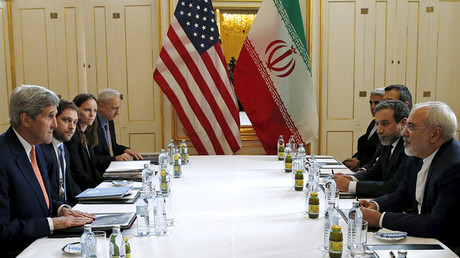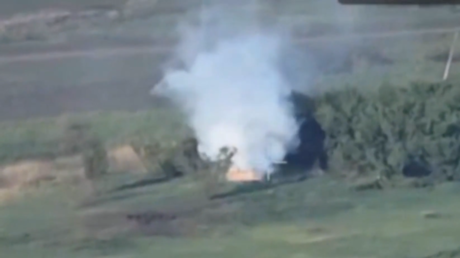Trump announces decision on Iran deal (WATCH LIVE)
US President Donald Trump is announcing that the nuclear agreement with Iran no longer serves US national security interests and is deferring to Congress the decision on whether to re-impose sanctions against Tehran that were suspended as part of the deal.
Trump wants a “more confrontational” approach to Iran, US Secretary of State Rex Tillerson said Friday. While the US will remain party to the internationally negotiated pact, the decision to decertify Iran’s compliance opens up avenues for Congress and Treasury to impose new US sanctions on Tehran not related to the nuclear program.
The US cannot evade its responsibilities under the 2015 nuclear pact, said Iran’s Foreign Ministry spokesman Bahram Qasemi, as quoted by Iranian media ahead of Trump’s announcement. However, he added that Iran will continue to expand its defensive power, including its ballistic missile program, which is not part of the agreement.
"Iran will strongly respond to any action against its military forces, including the Revolutionary Guards Corps," Qasemi said, according Iranian media quoted by Reuters.
The decision comes less than two weeks after top US military officials told Congress that Iran was complying with the 2015 nuclear agreement, negotiated to make sure Iran does not build nuclear weapons. US Defense Secretary James Mattis testified on October 3 that the US should stay with the Joint Comprehensive Plan of Action (JCPOA), which is the official name of the agreement.
The five other powers that negotiated the agreement alongside the Obama administration - Russia, France, Germany, China, and the United Kingdom - have all said the deal will stand even if the US pulls out, because Iran has been in compliance with its terms. Tehran’s compliance was recently confirmed by the International Atomic Energy Agency (IAEA), the main nuclear watchdog.
However, some world powers have warned against the consequences of a US decision to withdraw from the agreement.
“A termination of the Iran agreement would turn the Middle East into a region of hot crises,” and would “send a devastating signal for nuclear disarmament,” German Foreign Minister Sigmar Gabriel was cited by Die Welt on Thursday. “Some states could understand a failure of the Iran agreement as a signal to provide themselves with nuclear weapons as fast as possible,” he added, apparently referring to North Korea.
EU leaders “also have to tell the Americans that their behavior on the Iran issue will drive us Europeans into a common position with Russia and China against the USA,” the German foreign minister warned.
On Friday, Beijing called on the US to maintain its commitment to the nuclear deal with Iran: “We believe this deal is important to ensuring the international nuclear nonproliferation regime and regional peace and stability. We hope all parties can continue to preserve and implement this deal,” the Chinese Foreign Ministry said in a statement.
Russian Foreign Minister Sergey Lavrov said Thursday that it was hard to imagine how withdrawal from the nuclear deal with Iran could be legally implemented by the US. The deal was also approved by a UN resolution, he added.
Last month, Iranian Foreign Minister Javad Zarif said that certification is not part of the deal and is only “US internal procedure.”
“It doesn’t absolve President Trump and the administration of the responsibility because the only authority that has been recognized in the nuclear deal to verify [compliance with the deal] is the IAEA,” Zarif said.
In accordance with a mechanism set up by the US Congress, the nuclear agreement has to be re-assessed by an American president every 90 days.
Under the terms of the deal, in exchange for lifting nuclear-related sanctions, Iran agreed to reduce the number of its uranium enrichment centrifuges by two-thirds, cap its enrichment below the level needed for weapons-grade material, reduce its enriched uranium stockpile by 98 percent from around 10,000kg for 15 years, and allow international inspections.




